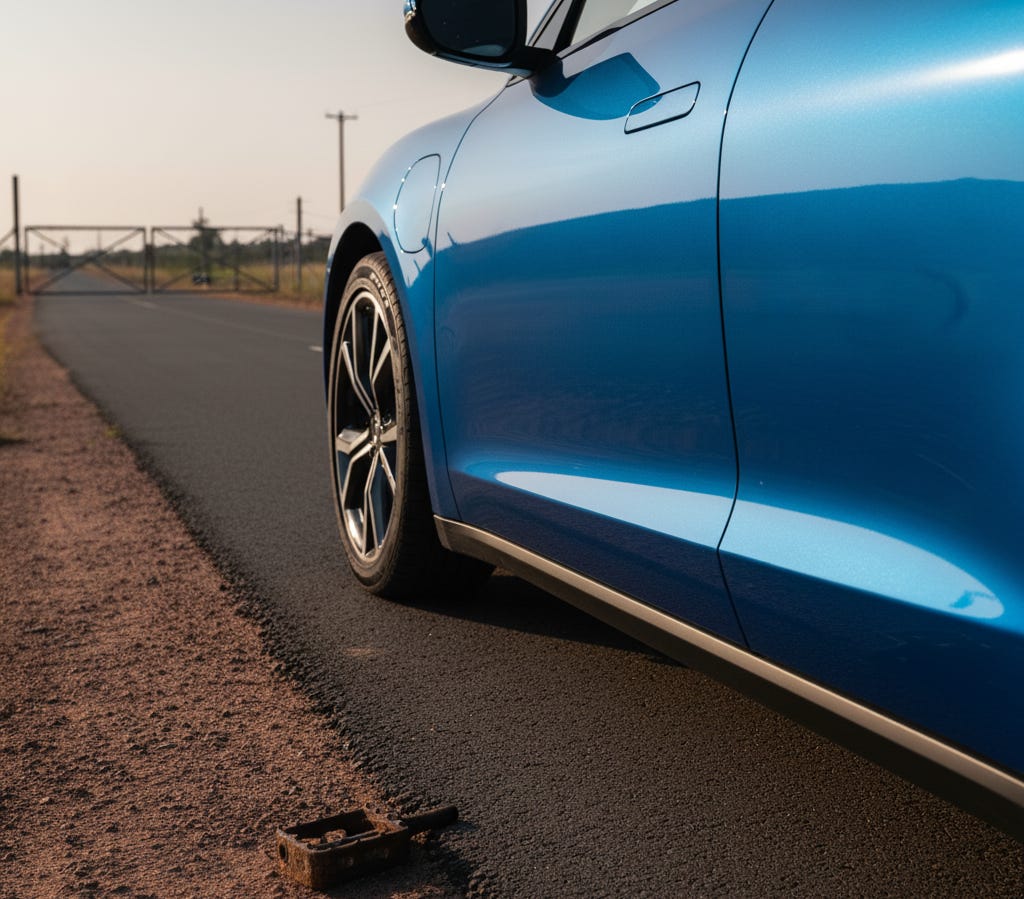Communism By Another Name
Involution
The evening air, usually thick with the smell of river mud and rapeseed fields, now carried a faint, metallic tang. It was the dust from the new rare earth mine, a fine gray powder that settled on windowsills and coated the leaves of the ginkgo tree outside. Inside, the sound of Lin chopping garlic was a steady rhythm against the low hum from the transformer recently installed on their street.
Wei’s face was illuminated by the blue light of his phone. He angled the screen toward his wife. “Look! The Seagull EV. They lowered the price again. It’s now cheaper than Cousin Feng’s new motorcycle.”
Lin didn’t look up from her cutting board. “And the salesman last week said the Leaper would never be cheaper. Then it was. You’re watching a river, Wei, waiting for it to run dry.”
“It’s not a river, it’s a faucet of bargains. And the government is paying the water bill,” he countered. He zoomed in on a picture of a gleaming white hatchback. “These companies in Shenzhen, they build too many. The officials in Guangzhou give them money to sell them here. We just have to wait for them to become desperate.”
Their son, Bao, pressed his small face against Wei’s arm. “Does it make a vroom-vroom sound, Baba?”
Wei shook his head, a smile finally breaking through his concentration. “No sound at all. You just float down the road. Silent. Like a fish in the water.”
The town square on Saturday was a chaotic festival of commerce. Banners in garish reds and yellows snapped in the autumn breeze, each promising an impossible deal. Cars with names like Meteor and Nova were parked in rows, their paint jobs reflecting the newly confident faces of the townspeople who milled about. A year ago, this square was where farmers sold cabbages from the backs of three-wheeled trucks. Now, young men in tight shirts shouted specifications and financing terms through crackling microphones.
A salesman nearly ran to them as they approached the Leaper display. “Brother, Sister, look at this interior,” he said, pulling open a door with a flourish. The smell of cheap plastic filled the air. “The battery is guaranteed for eight years. Eight! If you sign today, my manager lets me include a rice cooker. The best model.”
Lin ran a hand over the smooth, synthetic seat. She looked at the other families, some already signing papers on the hoods of their new cars. She looked at Wei. Her expression wasn’t pleading; it was weary. She was tired of being the only family whose son still arrived at school with his trousers damp from the morning mist.
Wei, however, felt a current of power. These desperate, city-born salesmen needed him. He was in control. He had heard a rumor from a friend at the cannery that Stellar Auto was on the verge of collapse and would soon dump its entire inventory for next to nothing.
“We need more time to think,” Wei said, his tone polite but firm. He placed a hand on Bao’s shoulder and guided him away, ignoring the salesman’s sputtering offers.
The news broke on a Tuesday, not with a whisper but a roar. A wave of bankruptcies had swept through the budget electric vehicle sector. The frantic race to the bottom had ended in a multi-car pileup of insolvency. Stellar, Leaper, Meteor; they were all just names in a news article now, their assets frozen, their factories silent. The report stated that the market had “stabilized,” with the state-backed giant, Apex Motors, absorbing the remaining demand. The faucet had been turned off.
The Apex dealership was a world away from the town square. It was a quiet, glass-walled building that smelled of clean carpets and money. There were no banners. A single man in a gray, perfectly tailored suit approached them, his smile minimal.
“We have the Apex-3 in blue,” the man said, after Wei explained what he was looking for. There was no mention of a rice cooker. The price was fixed, non-negotiable, and a full fifth higher than the Leaper had been. Wei paid it.
The drive home was preternaturally smooth. Wei gripped the steering wheel lovingly, the texture of the synthetic leather new beneath his calloused fingers. He glanced at Lin, who was watching the new concrete apartment blocks slide past, then met Bao’s eyes in the rearview mirror. His son was beaming. Wei had navigated the storm. He had been right to wait for the chaos to pass, and he had emerged with a solid, reliable machine from a company that would still exist next year. He had won.
He turned onto the long, straight road that flanked the mine. Ahead, the colossal steel gates, which had loomed over the town like a promise, were chained shut. A rusty padlock glinted in the afternoon sun. A sheet of plywood was wired to the bars, a few characters hastily painted on it: OPERATIONS SUSPENDED.
Further on, he began to pass the men. They came in a slow, steady stream, riding away from the mine. Men caked in gray dust pedaled bicycles whose frames groaned under their weight. Their heads were down, their eyes fixed on the pitted asphalt in front of them. No one spoke. The only sounds were the rhythmic squeak of un-oiled chains and the labored breathing of the riders. Wei’s new car slipped past them, a silent blue ghost in the sudden, heavy quiet.


